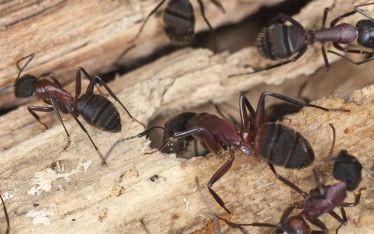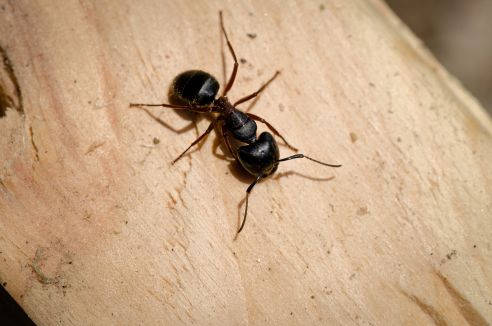What is the best homemade carpenter ant Killer?
Find the woodpiles, parent colonies, and nearby satellite colonies as the first step in eliminating carpenter ants. A carpenter ant infestation can be controlled using insecticide and baiting.
Pour the solution into a spray bottle after mixing together two parts water and one part liquid dish soap. Carpenter ants will die because the soap is toxic to them. You can also use it as a do-it-yourself remedy to spray it around openings to help keep ants out of your house.
These aphids are raised by carpenter ants, who guard them so they can later eat their honeydew. These ants will also consume other sweet things like honey, juices, or syrup, which can attract them to particular places.
What is the fastest way to kill carpenter ants?
Use of an insecticide containing pyrethroids is the most typical remedy. Getting insecticidal dust or spray inside the nest is tricky. Around electrical outlets or junction boxes, you should never spray liquids, however, you can use insecticidal dust in these locations.
You can spray into any openings already present, but to gain access to the colony, you’ll probably need to make more holes in the hollow doors or gaps in the walls. Always follow the directions on the pesticide packaging when using it. Additionally, only use it on nests; killing solitary worker ants will not make a dent in the issue.
Boric acid is among the most broadly available products for removing carpenter ants and other ant species among many carpenter ant synthetic fertilizers sold in stores.
How do pros get rid of carpenter ants?
You must enter the wall to harm the nest once you’ve located it by following ants, spotting “frass” close to a wall, or hearing a faint crackling sound inside the wall.
Drilling 1/8″ gaps every six inches is advised by Terminix in the territory where you think the nest may be. Boric acid should then be “puffed” through the holes using a bulb duster. (The ants will be killed by the boric acid.) To eliminate the nest, you might need to repeat treatments more than once.
Pheromone trails are used by carpenter ants to navigate and locate food sources. You’ve ruined this map to your home by cleaning the areas where ants have been. Use essential oils like those from cedarwood, tea tree, lemon, or orange.

Does vinegar work on carpenter ants?
A very powerful natural deterrent for carpenter ants is vinegar. Their pheromone trails are broken, and the smell keeps them from coming back. In a spray bottle, combine vinegar and water in a 1 to 1 ratio (both apple cider and white vinegar will do).
Vinegar repels ants. They will avoid it or leave the house permanently because of the smell of vinegar. Ants march toward the food sources in a straight line as they crawl. These pheromones will be disrupted by the vinegar solution, which will cause the ants to scatter.
Spraying a citric acid solution on ant paths may deter ants for four to forty-eight hours. In order to get from their nest to a food source, ants leave behind scent trails that are destroyed by the acids in vinegar.
What is the best product to kill carpenter ants?
Only KM Ant Pro Ant Bait Station or Advance Carpenter Ant Bait will effectively kill carpenter ants over the long term. These feeders can be used minimally and placed near the nest’s origin or somewhere the ants can access them.
Start with small doses of Advance Carpenter Ant Bait (spoonful size) and check infrequently to see if the ants are consuming it. If so, additional bait can be used. As much substance as the ants will eat should be used. Keep in mind that you might be attempting to deal with a carpenter ant infestation that has thousands of ants inside.
How does baking soda get rid of carpenter ants?
Carpenter ants and other ant species dislike powdery, chalky substances because they hinder their ability to track objects, making it more difficult for them to locate one another and carry out their typical ant activities. In places where you don’t want woodworker ants but have encountered them before, scatter baking soda.
Because ants are aware of pure baking soda, you can use it to deter them from entering your home by sprinkling it around entryways, window sills, and other entrances. You can also drizzle some in display cases, under sinks, and other dim, moist areas of your house where ants might congregate.
How do you kill the queen carpenter ant?
An ant queen cannot be replaced in colonies belonging to species where there is only one ant queen per colony. If she perishes, the colony will carry on until the last ants pass away from old age or predators. They will carry on acting as though everything is fine, yet without a queen, there won’t be any eggs or larvae to produce more healthy workers in the colony.
The most typical treatments are as follows:
- Boiling water: If you pour hot water through an ant mound opening, the colony should be flooded and all of the ants inside should die.
- Ant lures: Baiting techniques are successful because the laborers will bring the toxin back to the colony for the crown to consume.
What does cinnamon do to carpenter ants?
Cinnamon is frequently recommended as a successful DIY ant control solution. Ants can’t stand the smell of cinnamon, so it’s thought to act as a natural repellent. A cinnamon inhalation can also cause an ant to suffocate and perish. An ant’s path can be covered with ground cinnamon, which they can inhale.
To help deter ants, you can also dunk a cotton ball in a mixture of water and cinnamon volatile oils, then wipe down prevalent ant hotspots like doors and windows.
Cinnamon oil can be used to ward off ants, according to a study in the international journal of Scientific and Research Publications. The location and intensity of the cinnamon oil affect how well this control solution works.

